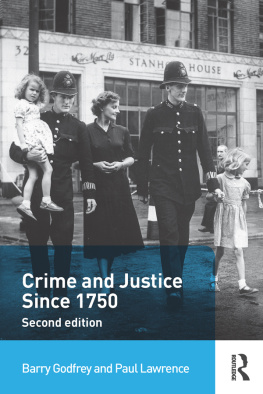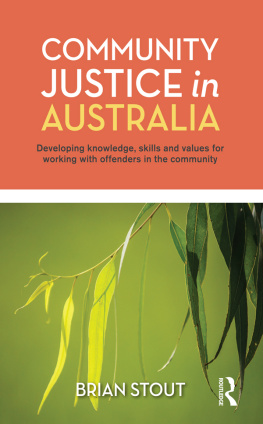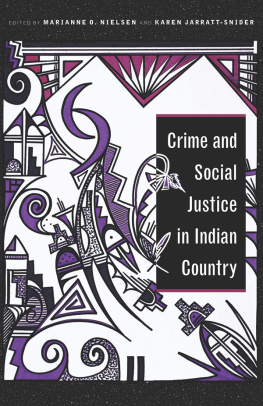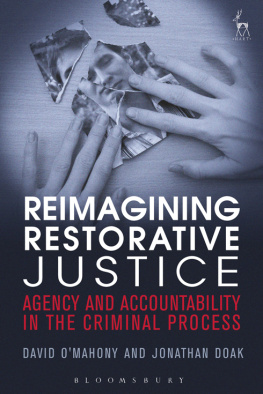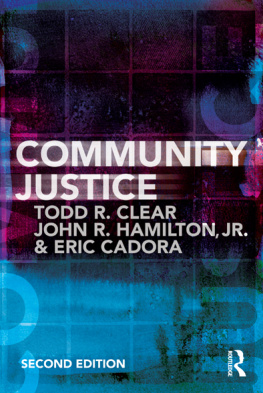REINTEGRATIVE JUSTICE IN PRACTICE
Welfare and Society
Studies in Welfare Policy, Practice and Theory
Series Editors:
Kevin Haines, Peter Raynor and Susan Roberts
Swansea University, UK
Welfare and Society is an exciting series from the Department of Applied Social Science at Swansea University, in conjunction with Ashgate, concerned with all aspects of social welfare. The series publishes works of research, theory, history and practice from a wide range of contemporary applied social studies subjects such as Criminal Justice, Child Welfare, Community Care, Race and Ethnicity, Therapeutic and Intervention Techniques, Community Development and Social Policy. The series includes extended research reports of scholarly interest as well as works aimed at both the academic and professional communities.
Also in the series:
The Disabling State of an Active Society
Mikael Holmqvist
ISBN 978-0-7546-7832-8 September 2009
Persistent Young Offenders: An Evaluation of Two Projects
David Lobley and David Smith
ISBN 978-0-7546-4183-4 October 2007
Supervising Offenders in the Community: A History of Probation
Theory and Practice
Maurice Vanstone
ISBN 978-0-7546-7174-9 (Pbk) June 2007
Residential Care: Horizons for the New Century
Edited by Hans Gran Eriksson and Torill Tjelflaat
ISBN 978-0-7546-4098-1 July 2004
Perspectives on Female Sex Offending: A Culture of Denial
Myriam S. Denov
ISBN 978-0-7546-3565-9 January 2004
Social Justice and the Politics of Community
Christine Everingham
ISBN 978-0-7546-3398-3 December 2003
Reintegrative Justice in Practice
The Informal Management of Crime in an Island Community
HELEN MILES
States of Jersey Police, British Channel Islands
PETER RAYNOR
Swansea University, UK
First published 2014 by Ashgate Publishing
Published 2016 by Routledge
2 Park Square, Milton Park, Abingdon, Oxon OX14 4RN
711 Third Avenue, New York, NY 10017, USA
Routledge is an imprint of the Taylor & Francis Group, an informa business
Copyright 2014 Helen Miles and Peter Raynor
Helen Miles and Peter Raynor have asserted their right under the Copyright, Designs and Patents Act, 1988, to be identified as the authors of this work.
All rights reserved. No part of this book may be reprinted or reproduced or utilised in any form or by any electronic, mechanical, or other means, now known or hereafter invented, including photocopying and recording, or in any information storage or retrieval system, without permission in writing from the publishers.
Notice:
Product or corporate names may be trademarks or registered trademarks, and are used only for identification and explanation without intent to infringe.
British Library Cataloguing in Publication Data
A catalogue record for this book is available from the British Library
The Library of Congress has cataloged the printed edition as follows:
Miles, Helen.
Reintegrative justice in practice : the informal management of crime in an island community / by Helen Miles and Peter Raynor.
pages cm (Welfare and society)
Includes bibliographical references and index.
ISBN 978-0-7546-7685-0 (hardback : alk. paper) 1. CriminologyJersey. 2. Restorative justiceJersey. 3. Justice, Administration ofJersey. I. Raynor, Peter. II. Title.
HV9960.G72J476 2014
364.942341--dc23
2013020854
ISBN 9780754676850 (hbk)
ISBN 9781315604602 (ebk)
Contents
List of Maps and Tables
Maps
Tables
Acknowledgements
We are grateful to the Building a Safer Society Strategy and the Jersey Probation and After-Care Service for funding this research; to the former Attorney General, the Comit de Conntables and the Centeniers Association for allowing the research to proceed; to the many individual members of the States Police and the Honorary Police who helped us, and particularly the Centeniers and other participants in Parish Hall Enquiries who allowed us to observe them. We would also like to thank David Smith for helpful advice on an earlier version. The views expressed in this book are the authors own, not those of the States of Jersey or any of the organisations mentioned above. To preserve confidentiality the names of all participants have been changed.
Finally, we are also indebted to Barbara Pretty and Claire Jarvis at Ashgate for their invaluable contribution to putting our work into a presentable form.
Foreword
by John Braithwaite
Helen Miles and Peter Raynor add something utterly distinctive to the literature of criminology, law and society in this book. They tell the story of a rather restorative system of justice on Jersey, the largest of the Channel Islands, that survives today after 800 years. Narrative and quantitative data are deftly woven together in the book to document this contemporary story, its history, and its relevance to criminological theory, particularly the theory of restorative justice. The authors are to be congratulated on such a lively book. It is a challenging accomplishment that delivers a unique and instructive perspective.
A comment sometimes made about restorative justice is that it can only work as the dominant form of dispute resolution in simple or dwindling societies. Miles and Raynors retort is that Jersey is neither dwindling nor is the society simple yet the Parish Hall Enquiry system remains the conventional response to dealing with unwanted behaviour. This book argues that Jersey is a low punishment, low crime, low recidivism society with very limited spending on a criminal justice system that is largely entrusted to community volunteers. Jersey is one of the wealthiest nations in the world, having a GDP per capita approximately twice that of the UK. It continues to have a diversified economy with flourishing fishing and agricultural sectors (breeding the high butterfat Jersey cow) and tourism. Two-fifths of its economy is finance capitalism. One of the attractions of the island as an international financial centre is its safety and the security of property rights, including the property rights of those avoiding other countries taxes. It is a highly sophisticated economy that avoided the catastrophes of other island financial centres such as Iceland, Ireland and Cyprus during the current Global Financial Crisis.
Volunteer police who enabled Jersey Parish Hall Enquiries to be the key justice institution survived because Jersey was a liminal state at the intersection of the great French and British maritime empires. It was able to assert its geography to establish a high degree of independence from both of its medieval Norman customary law. Miles and Raynor explain that community gatherings of the type that survived to regulate illegality in Jersey existed in the customary law frameworks of much, perhaps most, of Europe more than a millennium ago. The accession of Holy Roman Emperor Charlemagne to the French throne made it more difficult for these community gatherings to survive in France. Charlemagne and his successors increased their power by remodelling and rationalising the feudal systems of France; Jersey was always far enough away or unimportant enough to avoid the reach of that rationalisation of feudal institutions of governance. In the 1940s, Jersey was occupied by a particularly pulverising form of modernity in the Nazi war machine. It also failed to bring Jerseys medieval justice indigeneity to heel.



